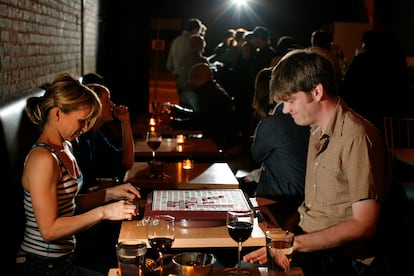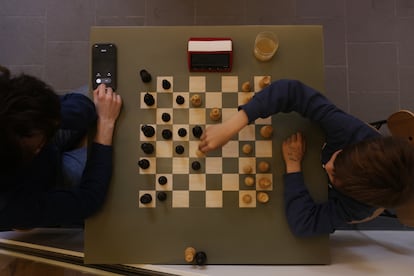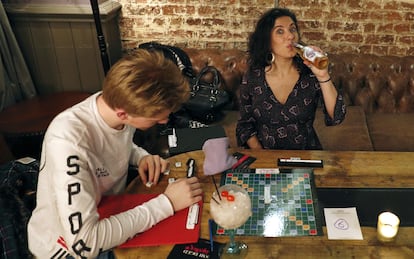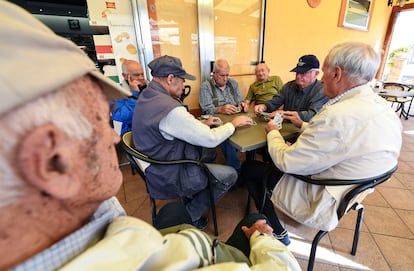Fewer screens and more domino: Why playing cards and board games are staging a comeback in bars
The sight of a group of friends playing a game together is no longer confined to retirees. Young people are rediscovering Connect 4, Trivial Pursuit and chess, and establishments are embracing a long-term business opportunity: building a community among their clients

A few months ago, Bloomberg journalist Joe Weisenthal humorously lamented on the social network X: “All the cool people of NYC are playing chess late at night in bars now. Wild times.” The post, which was accompanied by a photo of various people gathered in front of chess boards, opened a small debate and generated more than 300 comments where people were mostly in favor of the late-night games. “Where is that?” someone asked. “It’s the only bar I’d like to go to right now.”
Although the New York scene of dancing and debauchery until dawn is certainly not dead, it is becoming more and more common, in New York and elsewhere, to find late-night tables where people consume pints, cocktails and juices while playing board games. And this is not just in bars. Board games have invaded spaces where it was unthinkable a few years ago. Last week, there was a TikTok video of group of young people playing Catan before a concert of the Argentine band Miranda!
These are not isolated facts, but proof that traditional games have established themselves as a leisure activity option among people in their 20s and 30s, something that few could have foreseen. We are told of a youth absorbed in the screens that would eventually lose all human contact but, all of a sudden, a bunch of kids under 20 are sitting at a table in a bar and one of them takes some cards out of his backpack and they all get into a game of something as unfashionable as Chinchón or Brisca (both popular Spanish card games).

In addition to the “Mobile, wallet, tobacco, keys” as sung by Las Bistecs in their song Cosas Negras, we should now add the Spanish deck of cards by Heraclio Fournier, something of a national treasure in Spain. “They don’t take up any space and you can play anywhere. If the bus takes a long time? One game. As long as there is more than one of you, you can play,” says María, who never leaves home without them. “Also, if you play something familiar, you can focus on the game while you talk about anything else.”
This is not a far cry from the leisure time enjoyed by our grandparents, who always sat at a table for four, singing and playing the dominoes while at another table a group of ladies shook the Parcheesi cup. Interestingly, and according to the people who have participated in this article, women over 40 years old are the ones who play the least. In most of the hotel establishments there have always been cards and a board, but until a few years ago they came to be seen as ornamental objects. Younger people were reluctant to ask to use them, playing games seemed to be confined to the faculty cafeteria or family evenings, but this scenario has changed in the last few years.
These are not leisure places exclusively for games where you can also drink, but bars that have made room on their shelves to display them as an extra, just like the newspapers, the television set or Wi-Fi connection. “The idea came up during a trip to Copenhagen,” says Inés, who owns El Paraguas with her husband Jorge, a popular spot in the nightlife scene of the Spanish city Oviedo, where you can always find someone playing chess or Trivial Pursuit. That trip served as the inspiration for a second location, La Armónica del Paraguas, where games have a prominent place. “There we discovered the Bastard Café, a downtown classic where you can find over a thousand games, and we loved it. There were all kinds of players, but most of them were in their 20s and 30s.”

They were inspired and, eight years later, they feel that it is a success. Manu, who is in his 20s and has always been a fan, runs the establishment. “I used to play Bang!, Virus, Saboteur, Shit Happens [special card games]... but then there was the lockdown and that was the end of that.” As soon as the Covid-19 restrictions began to be lifted, the gatherings on sidewalk cafés for “board game evenings” returned. “We would play Time’s up, Trivial Pursuit and Risk until it was curfew [under the pandemic restrictions]; and the next day we would meet on another sidewalk café to play Secret Code and Wingspan. There wasn’t a week that went by when I didn’t have a chip or the dice in my hands.”
He now provides advice to others on games, but has not given up on them. “Sometimes my friends play Taboo at the bar and want me to join in while I’m slicing lemons.” Manu notices differences in the types of customers who come to have a game. “The younger ones prefer Dixit, Dobble, which has caused more than one friendship to break up, or Trivial Pursuit, and those in their 30s and older prefer backgammon and chess.” He has also identified what he calls “Tinder couples,” who he says are first-timers, and who opt for another classic, Connect 4.
Manu believes that the people who come to play create “a better atmosphere.” “They want more than just a bar, they want to experience a fun atmosphere.” He also says that those who come to play “long games” tend to consume little alcohol: “They come, order something, usually soft drinks or juices, grab the game they have their eye on, put the tables together and start playing. And they stay there happily. From time to time I pass by to see if they need anything, but I don’t interrupt. They get into the game, laugh, joke, pause if someone needs to smoke or go to the bathroom, and then someone comes to ask for something that is missing. But maybe after an hour and a half, they’ve had three orange juices, and now they’re having a Nestea and a Kas. Not a drop of alcohol and they’re enjoying themselves. If they’re having a good time, why should they drink?”

While there are bars where after a certain time the cards and boards disappear, for Manu it is not a problem for people to occupy a table for hours (and anyone who has played Risk knows that it is literally for hours). “We’re aware that there are other types of venues that favor heavier consumption with music, lights and dancing, and that in relaxed places you always have the risk that people will gather without consuming, but I don’t think that games encourage this. We’ve gone for something quieter, although we know that we won’t get rich with this business model,” jokes Inés.
This is very much in line with the thoughts of David, owner of La Raposa, an establishment where you can listen to hardcore music and watch a soccer match while playing a game of Jenga. “We want to offer more than just a place to drink; we want to create community.” David sought to replicate the environment in which he grew up: “Playing created some great dynamics.” When it comes to choosing games, he is quite selective: “As it’s a bar known for its left-wing ideology, I try to include games that also encourage critical thinking, such as the feminist trivial game and so on.” He also agrees that the public is heterogeneous, but that young women are the ones who tend to gather to form playing groups.
He is not surprised that someone might bring their own games from home, but he is that the game extends into the early hours of the morning when it was customary for evening and weekday entertainment. “Now large groups of kids come on Saturdays to play a game of Trivial Pursuit or Dixit and stay there all night. Hanging out and playing is a way to curb the anxiety of planning where you will go next.”
He also has a response to another of the comments to the tweet that mocked the “wild” New York night and asked why these people didn’t play in their homes: “I share an apartment and, though my roommates are nice, I cannot occupy the living room to play a game of Risk for hours on end or make too much noise.” And some games are noisy or too festive, such as Time’s up or Party, two of the most popular board games. He also claims that a bar that has games “sends a message”: it is usually a quiet place, “with a good vibe.”

The fact that there are different personalities among those who come together to play is important for Patri: “You need a balance between those who are competitive and those who are compliant so that everything goes well, so that there’s the right balance to enjoy it without it getting out of hand. The intensity and the way of playing changes and that’s the beauty of being able to play in a bar, you can adapt it to the spirit of the group.” Socializing is one of the strong points that always comes up when talking about board games. “People like to socialize and one of the oldest tools that exist for this is board games. We like to challenge each other, but most of all we like to have a good time and have fun. That’s what a board game does, it gives you hours of quality entertainment,” says Fernando Falomir, marketing manager of the Spanish gaming company Falomir.
Its potential to connect people is one of the main advantages of board games: it is a way to make friends, which is why in Spain, the bars that provide this type of entertainment are often the first stop for foreign students, especially for those from northern European countries, where this type of entertainment is a daily feature. “It’s a totally different experience and is compatible with electronic leisure: it’s something that requires meeting up, getting together and spending time with friends. Many adults now associate the screen with work and want to take a break from spending so many hours in front of a computer and on a cell phone,” says José Luis Viruete, head of communications at Asmodee Ibérica, whose extensive catalog includes popular games such as Dobble and Dixit.
The introduction of new audiences and new scenarios has certainly contributed to this booming market. “Although the confinement saw a boom that obviously couldn’t continue in the same way in the following years, the sector has been growing for 10 years and will continue to do so in the near future,” he points out. Fernando Falomir agrees: “Right now, the sector is in a very good moment for the consumer, as both creators and publishers are trying to launch games of increasingly higher quality both in terms of mechanics and components.”
The companies that market the games are not surprised that they have found their way onto bar tables: “We believe this is a natural evolution of gameplay,” says Viruete. “It’s very much our custom, and if our elders gathered to play dominoes or Mus [a card game], it was only a matter of time before others did the same to enjoy a game of something like Exploding Kittens.”
Sign up for our weekly newsletter to get more English-language news coverage from EL PAÍS USA Edition
Tu suscripción se está usando en otro dispositivo
¿Quieres añadir otro usuario a tu suscripción?
Si continúas leyendo en este dispositivo, no se podrá leer en el otro.
FlechaTu suscripción se está usando en otro dispositivo y solo puedes acceder a EL PAÍS desde un dispositivo a la vez.
Si quieres compartir tu cuenta, cambia tu suscripción a la modalidad Premium, así podrás añadir otro usuario. Cada uno accederá con su propia cuenta de email, lo que os permitirá personalizar vuestra experiencia en EL PAÍS.
¿Tienes una suscripción de empresa? Accede aquí para contratar más cuentas.
En el caso de no saber quién está usando tu cuenta, te recomendamos cambiar tu contraseña aquí.
Si decides continuar compartiendo tu cuenta, este mensaje se mostrará en tu dispositivo y en el de la otra persona que está usando tu cuenta de forma indefinida, afectando a tu experiencia de lectura. Puedes consultar aquí los términos y condiciones de la suscripción digital.









































